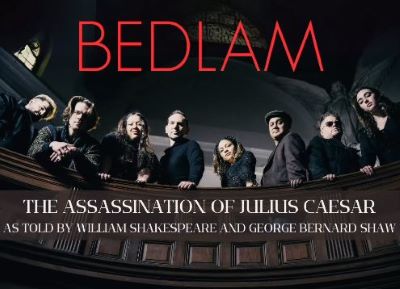THE IDES HAVE IT
It’s 44 BCE, March 15, and Julius Caesar walks toward his death, changing the course of Western history. Exactly 2,067 years later, at the West End Theater in New York, a commendable, ambitious experiment, adapted and directed by Bedlam Artistic Director Eric Tucker, tackles the scorching subject, and leaves us with mixed feelings. Tucker picked a critical moment, the transition from the Roman Republic to the Roman Empire, to explore power, leadership, fate versus free will, and the interaction of rulers and ruled. He did it in three ways: through Shakespeare’s and Shaw’s depictions of Julius Caesar’s last years, and by showing us the rehearsals of the two plays, in no particular order. Confusing? Yes, especially at the beginning when Shayvawn Webster switches in a second from Cleopatra to Brutus, LABOD from Cleopatra’s nurse Ftatateeta to calculating Cassius, and the transitions between the scenes are intentionally abrupt.
Andrew Rothenberg
To add to the confusion, Shakespeare wrote the tragedy in 1599, Shaw his comedy in 1899; the first takes place in Rome, the other in Egypt four years before the assassination; both writers admire Caesar, played by Andrew Rothenberg, but they have very different ideas on the character of the ruler. It’s almost impossible to mix them up. Shaw thought that Shakespeare made his Caesar “a travestying of a great man as a silly braggart,” so we are talking about two different men, in two different times and places. If you don’t know the plays, or a bit of Roman history, it’s going to be hard to follow.
Stephen Michael Spencer, Rajesh Bose, and Andrew Rothenberg
In Rome, it’s all about Caesar but Shakespeare makes Brutus the hero, giving him the best part and changing the narrative that saw him, until then, as one of the greatest betrayers. Shayvawn Webster’s Brutus makes us feel his honorable intentions, makes us question whether Caesar’s position in power is ethically acceptable, and his pain in choosing the greater benefit of Rome over his beloved leader, his friend. Webster nailed it. As Cleopatra, she turned seamlessly from a terrified child into a terrifying ruler, showing us what Shaw intended, untamed natural passion.
Shayvawn Webster and LABOD
LABOD, as Cassius, plays the perfect troublemaker, rambunctious when he needs to convince the other senators that Caesar is an imminent dictator, and playfully devious when he uses Brutus’s friendship to emotionally force him into the conspiracy, to benefit from his honorable status. Jonathan Judge-Russo, as Casca, adds a bit of humor with his easily-manipulated, foolish version of the conspirator.
Deychen Volino-Gyetsa, Rajesh Bose, and Stephen Michael Spencer
All the main characters are unable to read people and events, most of all Caesar. Andrew Rothenberg doubles as both leaders, the ruler and the director of both plays, bringing the needed gravitas to Shakespeare’s Caesar, light pragmatism to Shaw’s version, and complete nonsense to the thespian. On his right side there is always Anthony, played by Stephen Michael Spencer who gives his best during the funeral oration to win the masses over to his side.
Jonathan Judge-Russo, Stephen Michael Spencer, Shayvawn Webster, Mackenzie Moyer, Andrew Rothenberg
With so much ambition and rivalry in both plays, the intervention of Ra, god of the sun, from Shaw’s comedy, comes as a needed break and establishes a historical and cultural context in Egypt. Played by Rajesh Bose, Ra is hilarious, insulting, and commends the audience to pay attention. Mackenzie Moyer and Deychen Volino-Gyetsa complete the cast, both flawless in each of their characters.
Shayvawn Webster and Mackenzie Moyer
The audience laughed during most of the play, enjoying the rehearsal scenes the most. All the actors passionately embraced their multiple roles but the mixing of a comedy and a tragedy in a non-linear narrative, the brutal transitions and minimalist staging, didn’t help the flow of the play, making it more a work-in-progress than a finished product.
photos by Ashley Garrett
The Assassination of Julius Caesar
as told by William Shakespeare and George Bernard Shaw
BEDLAM
West End Theater, 263 W 86th St
ends on April 7, 2024
for tickets, ($89.00 including fees), visit Bedlam

